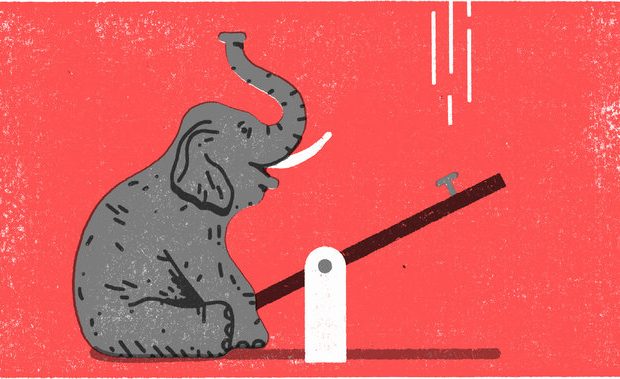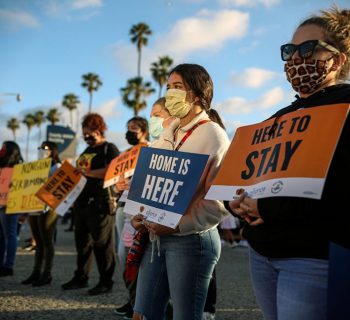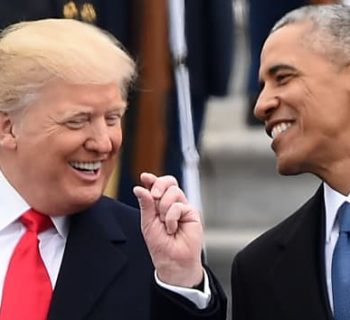By Erick-Woods Erickson, NY Times Opinions ~ October 14th, 2016
ATLANTA — Over the past few months, a cavalcade of Republican policy wonks, pundits and partisan strategists have beclowned themselves on national television trying to defend the indefensible: their party’s nominee. Free-trade advocates have become protectionists. Strategists are treating Drudge Report surveys as scientific endeavors while dismissing legitimate polls as Clintonian propaganda.
And this past week, leaders of the “religious right” solidified themselves as religiously wrong when they defended Donald J. Trump’s comments that he could grab women by their genitals because he was a celebrity. It was just words, some of these pastors asserted.
In November, when Mr. Trump’s meteor enters the atmosphere of the voting booth, Americans will be treated to a spectacular flameout as late-night comedians and professional Twitter warriors rush to tweet, “You’re fired!” But when the Russians go home, the pastors repent and riot police disperse white nationalist protests, the Republicans will need fresh ideas.
Republicans first must acknowledge there are legitimate concerns that fueled Mr. Trump’s rise. Both parties are more interested in listening to check writers than voters. Many Americans see their neighborhoods being overrun by addiction and poverty, but see neither help nor recognition of the problem from Washington. It is not hard to conclude that Republicans and Democrats alike value cheap, imported labor and could not care less about the heartland.

Mikey Burton
To win back the trust of the people, the Republicans need to recognize that the people have answers. The bulk of both major-party candidates’ support comes from voters who hate the other candidate more. Voters are being held hostage by hollow promises from both parties that Supreme Court nominations and Washington power will make their lives better.
Yet the founders never meant for presidential elections to be struggles over the Supreme Court. Nor was Washington to be the center of all solutions. Republicans need to focus less on Washington and more on fostering local community.
My wife and I have learned a great deal about community this past year. In March, angry Trump supporters showed up on our doorstep to berate me for not supporting their man. In April, I entered the hospital for a week with dozens of blood clots in my lungs. In August, my children were yelled at in a store by a man who wanted them to know their father was destroying the country by opposing Mr. Trump. This month, doctors confirmed that my wife, a nonsmoker, has a rare form of lung cancer. Just the other day, my son crept downstairs in the dead of night while I was working to ask if Trump supporters would be coming to our house again after the candidate’s latest scandal broke.
Through all of these events, it was not the federal government keeping watch on our house. It was our neighbors. It was not the federal government delivering meals to our home. It was our church. It was not the federal government picking up my children from school when my wife and I could not. It was our friends. It was not the federal government praying for us. It was our community.
Most Trump supporters believe their communities are under assault, and many feel too powerless and isolated to do anything about it. People need to feel more in control of their destiny, and that happens only when we ensure that their local governments shape their lives the most, not nine black-robed masters or a dysfunctional Congress in Washington.
That’s why Republicans should empower individuals by making school choice a priority. Education must be treated as a civil right, and parents should be allowed to pick where their children go to school. Education dollars should then be allowed to follow those students to those schools.
The Republican Party must be the party of religious liberty. When beliefs clash, people and government need to accommodate those differences. To force people of faith to adhere to secular standards is as much an imposition of a religious viewpoint as forcing secular people to adhere to the standards of a religion.
The party must also get government out of the marketplace, except to ensure a level playing field and protect against fraud. It must support innovation and creative disruption, lower taxes and reduce regulation. And it must find ways to help people transition out of our archaic social welfare programs by assisting them in establishing individual savings accounts that could pay for health care and college educations.
Lastly, Republicans should establish themselves as the party of heterogeneity, opposed to one-size-fits-all morality. Different communities should have the freedom to be different in the public square. To do that, the party must reduce the one-size-fits-all government in Washington and empower those laboratories of democracy: state and local government.
Most important, the Republican Party must recommit to a basic principle — character counts. The party that once impeached Bill Clinton for lying about an affair has defended a man who bragged about sexual assault. Character cannot be wedded to party politics, and the Republicans will have to make amends for defining deviancy down to defend the indefensible Donald Trump.







